Why are Marriage & Fertility Plummeting in MENA?
The impermissibility of cross-gender friendships, and the permissibilty of divorce.
The Middle East, North Africa and Anatolia are witnessing a rapid decline in coupling and fertility. This should rock your priors. Attitudinal surveys indicate strong religosity, frequent religious attendance, daily prayer and strong support for gender segregation. Over the past 20 years, religosity has stayed strong. Female employment is around half the global average, just 16% in Egypt. Hardly a hotbed for liberalism.
So what’s going on?
It’s the Economy?
If you speak to Egyptian single men, they blame the terrible economy and rampant materialism. In Harry Petit’s new ethnography, young men express deep frustrations, which I summarise below:
“There is no love without money here”
Any prospective groom faces a relentless gauntlet of interrogation, as Ibrahim explains: “You will go to a father and he will first ask, where do you work? What is your salary? Where do you live? Do you have a flat? The second day you will come back and he will ask, do you have a car?”.
“Fathers would rather keep girls safe than let them marry someone who might make her live in tough conditions” - Mahmoud.
“There is no difference between a good or bad person; if you have money you can marry”.
Some participants blamed competitive consumerism. “It gets crazy”, explained Ibrahim. “It is not just the father, girls now expect a lot because they see rich people on TV, or friends hang out together and boast about what they had bought for them”.
Men may feel trapped between a rock and a hard place: financial expectations are turbo-charged by global media, while jobs remains precarious.
What’s the Difference between MENA and South Asia?
Egypt’s economy is extremely tough, but youth unemployment can’t be a full explanation of collapsing marriage since Indian men have even larger rates of youth unemployment, seeking coveted government jobs, yet marriage rates are much higher.
South Asia is culturally similar in another respect. Cross-gender ties are rare - as indicated by Bailey, Johnston, Kuchler, Kumar and Stroebel’s analysis of Facebook. Their analysis of 1.8 billion users reveals that in the Middle East, North Africa and Anatolia, men and women have very few Facebook friends of the opposite sex.
Male honour depends on female seclusion. Fatima (in Cairo) does not even upload an avatar of her face - for this would shame her male kin. They might be labelled ‘dayooth’ (lacking protective sexual jealousy). When Fatima works late, her husband comes to drive her home. Her boss at the bank had offered to drop her at the metro station, but he says no - for fear of impropriety. His elder brothers do not permit their wives to work - for fear of sexual harassment.
Omar says, “No man can be trusted”.
With few opportunities to mix and mingle, charm and bond, it’s difficult to find someone one actually likes. If the matching criteria is actually more about financial security, then socio-economically disadvantaged young men may certainly struggle - likely marrying later.
But in all these respects, South Asia and MENA are similar. So what explains the difference?
South Asia has high rates of arranged marriages, while divorces are rare
One big difference is that South Asians have far higher rates of arranged marriage. When Indians need help, support, access to raw materials, markets, loans, or jobs, they usually turn to their trusted caste network. Insiders derive great benefit from jati and strengthen trust through wedlock. Thus, even if women are marrying later, marriage is nearly universal.
Divorce is also heavily stigmatised - totally taboo. Hindu Indians one of the world’s lowest rates of marital dissolution.
Pakistan also has very few divorces - even though this is permitted by Islam. Shabana (from Karachi) tells me that imams often strike it from the nikkah (wedding) contract. Family loyalty also weighs heavily. Even though Hussein’s beatings started within the first week of marriage, Shabana’s mother would not permit divorce as it would sour relations with kin.
Thus, even if cross-gender friendships are few and far between, South Asian families still consolidate and preserve nuptials.
In MENA, Cousin Marriages have been supplanted by Individual Choice
Middle Eastern and North African societies historically consolidated trusted networks of kinship through cousin marriage. But over the past 50 years, there has been a massive decline in fertility. This entails fewer cousins of a suitable age.
Chatting over several meals together, Omar (a government worker in Cairo) shared his family history. His grandfather had two wives, his parents were cousins, and he himself has 27 cousins. How many cousins does his son have? 4.
With fewer eligible cousins, MENA marriages are increasingly based on personal choice. Divorce is also permissible - it’s certainly allowed by Islam. In 2000, Egypt introduced no-fault divorce for women. Unlike Muslim Pakistanis, educated and urban Arabs increasingly marry non-relatives. Divorcing non-kin does not necessarily threaten family loyalty, clan strength or economic networks.
This generates tensions. Gender segregation makes it difficult to find deep emotional compatibility, but once married it is easy to exit.

It’s Tough to find Someone you Like, yet Easy to Exit
If marriages are freely chosen, yet young people do not necessarily know anyone of the opposite sex, let alone someone they actually like, then we should anticipate delays. And if marriages go ahead without strong emotional connection, yet divorces are perfectly permissible, dissatisfied couples may soon call it quits - as I have learnt through my qualitative interviews…
Cairo, Egypt
Omar is happily married, but concerned about rising divorces, with close friends reporting frictions within the first week. Incompatibility erupted in unbearable arguments, bitterness, and frustrations. They swiftly divorced - with terms he thought were extremely unfair.
Seeing tensions and trauma, Omar’s young brother (a pharmacist) is extremely reluctant to wed. Frankly - he doesn’t want the aggro.
Importantly, this should NOT be mistaken for individualism. Omar previously dated a woman for six months, always with a chaperone (wali). Respecting her family, he asked for marriage, but they ultimately said no. Family wishes are still widely respected. Omar certainly feels strongly loyalty to his own blood kin, and weighs these obligations equally with his wife.
Dalia (also from Cairo) divorced within a year. He wasn’t abusive, they just weren’t compatible, so parted ways. Dalia is still struggling in court, spending colossal sums on lawyers, trying to get financial support for her daughter, but has been unsuccessful. She subsequently remarried, but did not have another child.
Antep, Turkey
Elif is very beautiful, hilarious, superbly clever, modestly dressed and very pious. So how come she’s still single at 28? Frankly, she doesn’t know many men. Ahmet (a former classmate) has a good job as a doctor, and because I wanted to interview him, Elif kindly arranged for a visit. Ahmet was perfectly pleasant, and Elif privately shared that she would be open to marriage. Over the next few months, I waited with curiosity. But Elif would not make any moves - it would be improper.
Since 2001, Turkish divorces have doubled. Young women are becoming more individualistic. When Ece’s cousin’s husband turned violent, she left immediately, taking their one child and was supported by the entire family.
The impermissibility of pre-marital intimacy makes it very difficult to predict emotional compatibility.
London, UK
Hussain and Fatima are tying the knot - but have only met with a chaperone (wali). It’s absolutely their choice, but truthfully they don’t know each other very well. As a result, there are some last-minute surprises. Hussain (whose mother is Moroccan) told (hijab-wearing) Ayesha not to wear a fitted wedding dress since his friends are coming and this would be seriously embarrassing. Ayesha was taken back - startled! Maybe she under-estimated his conservatism. Another time, Hussain criticised Ayesha for chatting with shop assistants. Surprised, she didn’t know he would find her openness problematic. Yet both families think this perfectly fine, at least they are pious.
I very much hope that Ayesha and Hussain have a happy marriage. By contrast, her friend Mirha divorced within a year - upon discovering her (Muslim) husband was an alcoholic.
MENA combines the impermissibility of cross-gender ties and the permissibility of divorce.
Dating is tough - especially if religious piety and social respectability discourage cross-gender ties. Urban young women may also be becoming more progressive, seeking increased freedoms and greater respect. If divorce is also permissible, incompatible couples soon part ways. Short nuptials obviously restrict births. No wonder, MENA is seeing a steep decline in marriage and fertility.



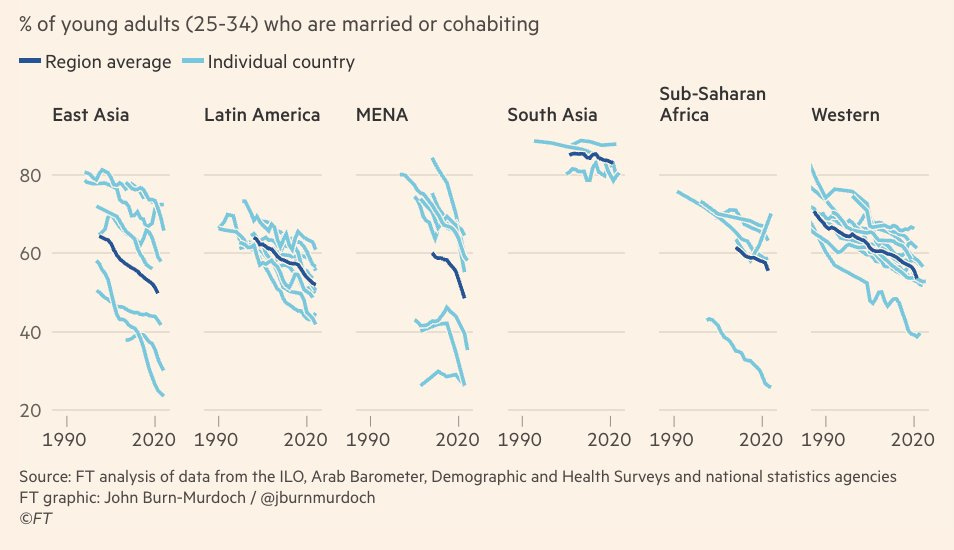




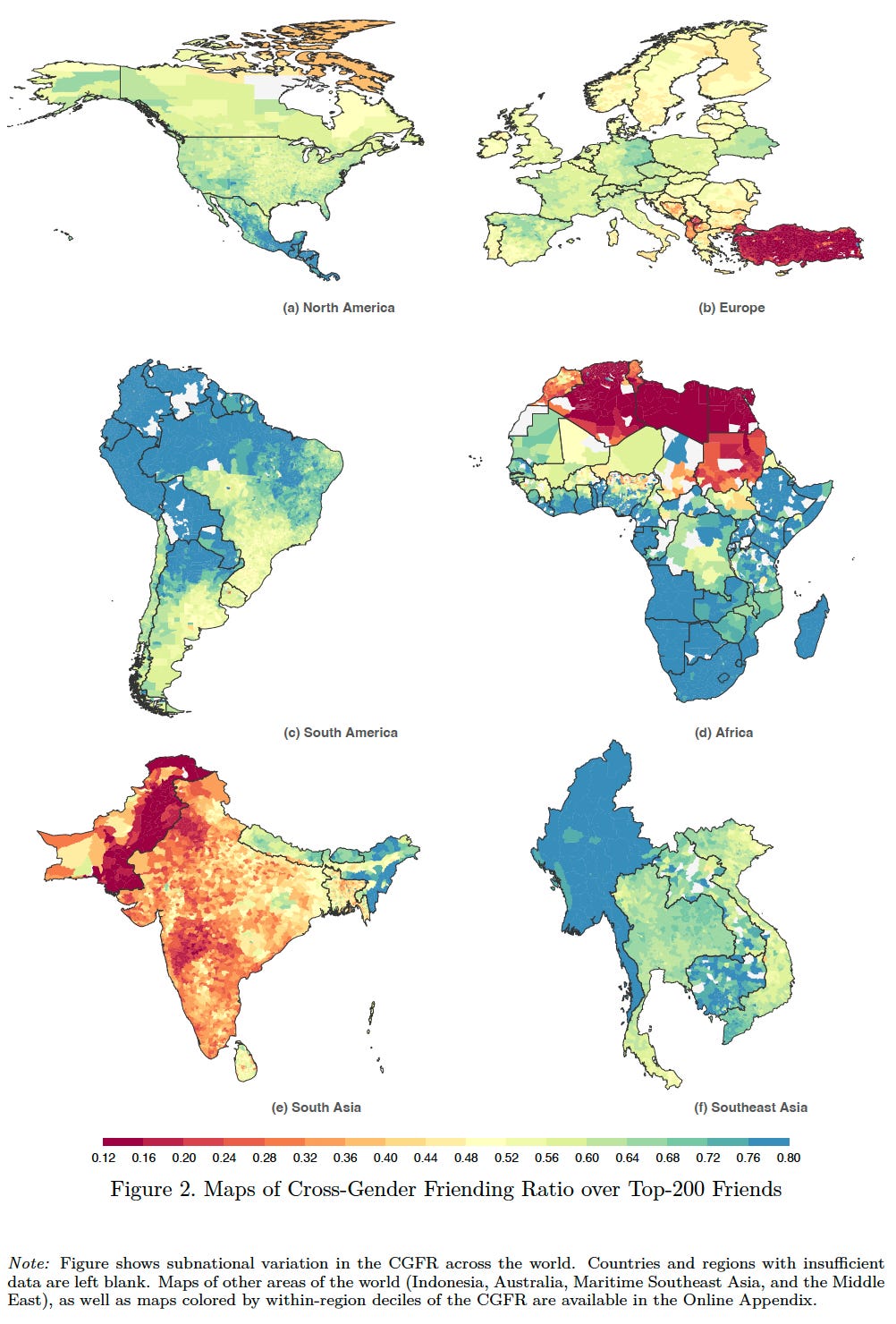
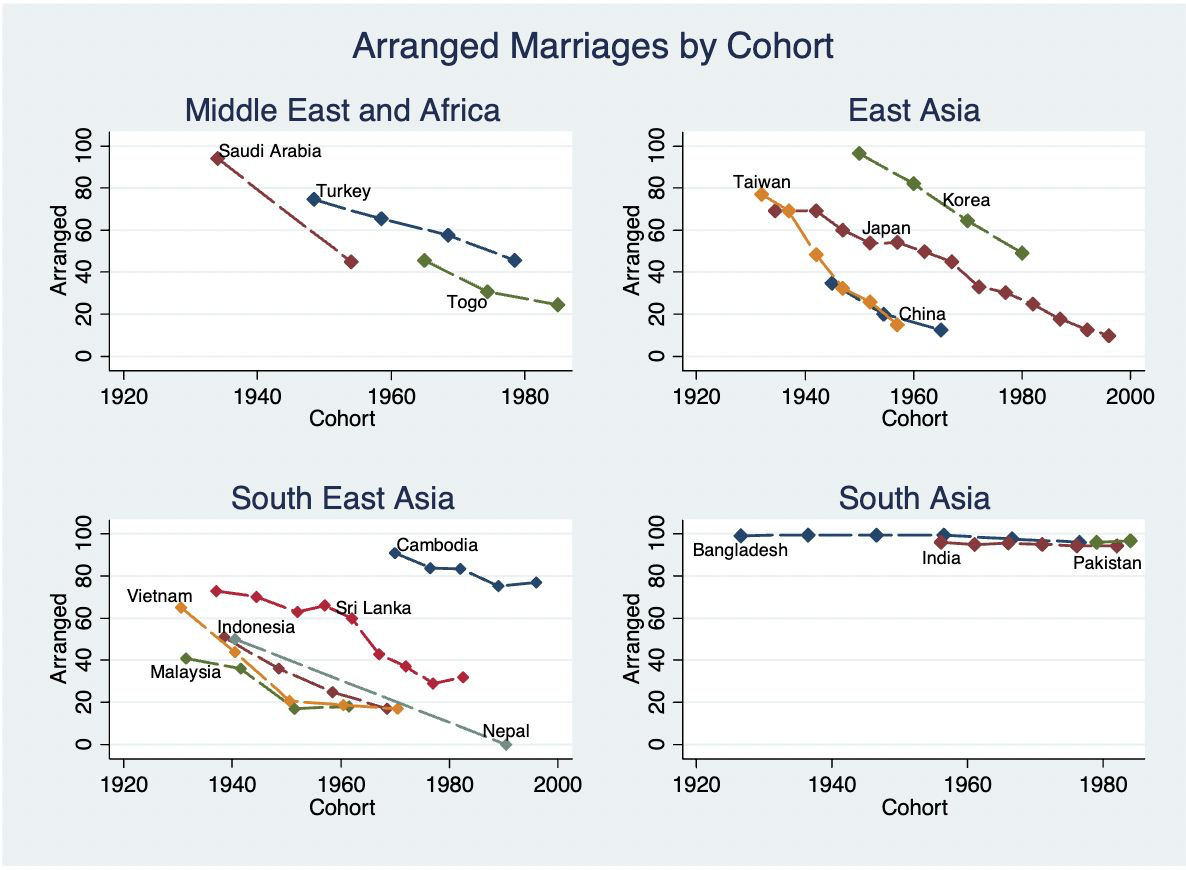


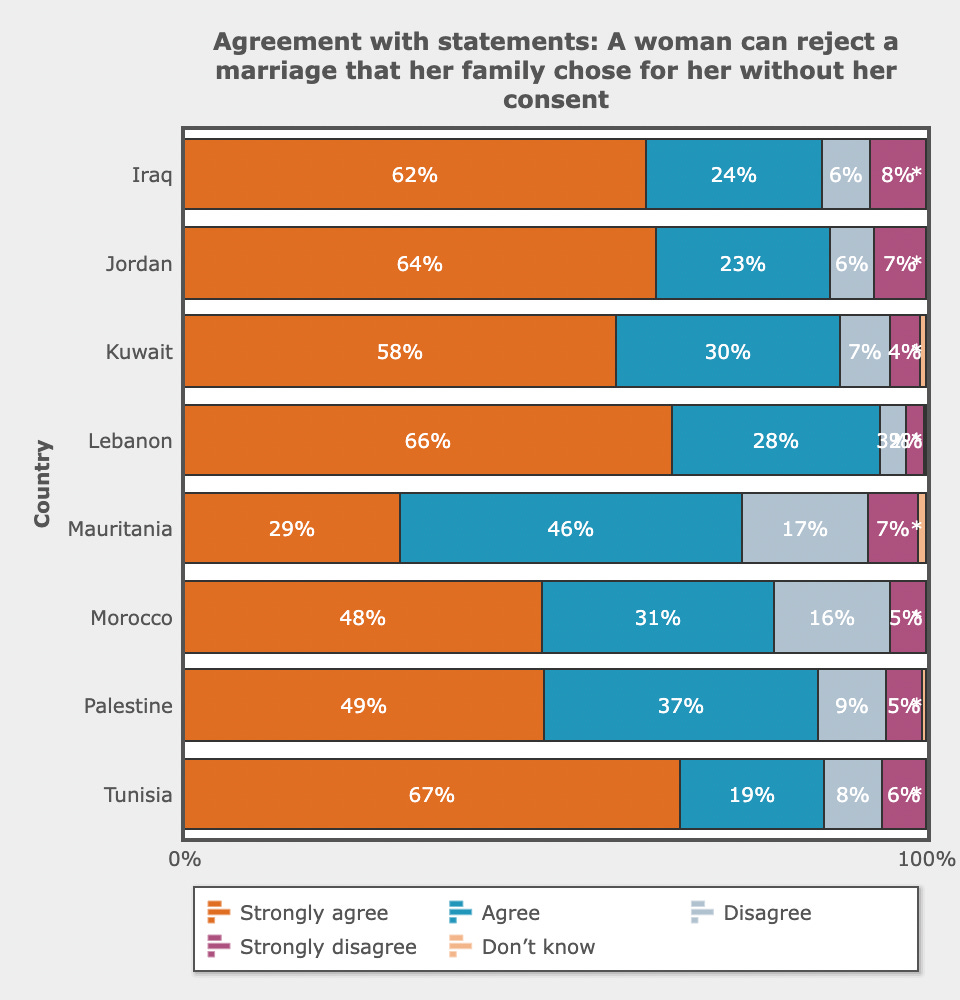

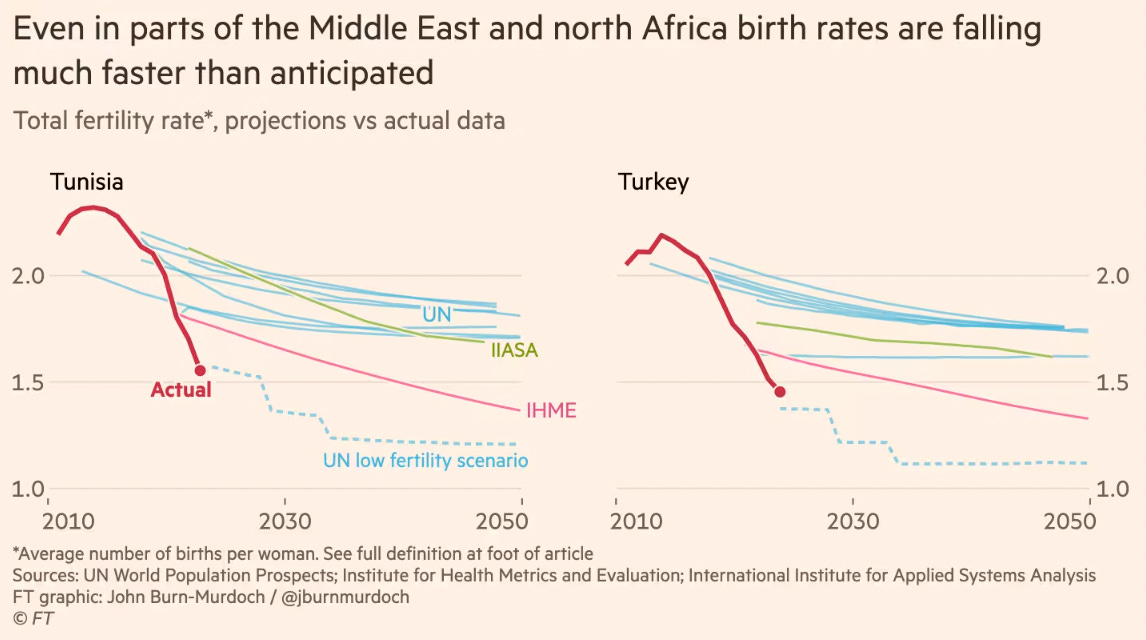
Very interesting as always. I noticed a bit of this while in Cairo 8 years ago. Men and women in segregated groups, getting older and older but still not able to date each other without a chaperone. They’d say they’re “engaged” to be able to catch a minute of authentic unsupervised alone time with a boyfriend or girlfriend. Lots of anxiety, fear, turning toward piety, and sometimes wholesale rejection of interaction with men amongst the women, secret and shameful frequenting of sex workers amongst the men
Thanks again Alice, it will fascinating to see when / if and how culture will change